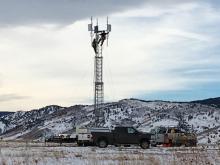Newsroom
Use the filters below to narrow publications by offices, programs or categories
By Bob Cannon, Senior Telecommunications Policy Analyst, NTIA
My name is Bob. I am number six.
Do you believe me?
If I were wrong… would you know?
In the 1960s television show “The Prisoner,” retired secret agents are held captive in a place known only as “The Village” and assigned numbers to replace their identities. Protagonist “Number Six” quickly learns that what one claims to be and what one is can be two different things.
The National Telecommunications and Information Administration is embarking on an inquiry into whether more privacy protections are necessary for people who have registered “.us” domains on the Internet.
NTIA administers the contract for the country code top-level domain, for the United States, .us. The .us domain is used by American businesses, individuals, and localities.
Americans increasingly rely on radio spectrum for much of their daily lives. From texting friends to car navigation these airwaves play an invisible but central role.
Much like other important resources, spectrum access is finite. Demand continues to grow. Federal spectrum policy experts recognize this – and have come up with creative new ways to allow greater spectrum access by sharing this vital resource.
This April marks the 6th annual National Supply Chain Integrity Month. NTIA and its Federal partners are pleased to participate in this campaign to raise awareness of the threats to supply chains, the resources available to mitigate such threats, and ways to build resilience to future risks.
By Christopher Maximos, Intern in the Office of Congressional Affairs
I still remember the sense of wonder that I felt when I entered the Herbert Clark Hoover Building for the first day of my internship. I could almost feel the history of the Department of Commerce as I walked through meeting rooms filled with antiques and hallways blanketed by the portraits of previous Secretaries.
Wireless connectivity empowers nearly every aspect of modern life, and reliable access to spectrum resources is essential.
On Wednesday, the Biden-Harris Administration announced the formal launch of the $1.5 billion Innovation Fund, an initiative designed to support the development of open and interoperable 5G and future generation technologies. Funded by the CHIPS and Science Act of 2022, this historic investment aims to drive wireless innovation, strengthen supply chain resilience, and unlock opportunities for new and emerging companies to compete in the global telecommunications market.
The National Telecommunications and Information Administration (NTIA) issued a Federal Register Notice to seek expressions of interest from individuals who would like to serve on the Board of the First Responder Network Authority (FirstNet Authority Board or Board). Prospective candidates must have expertise or experience in at least one of the following areas: public safety, network, technical, and financial.
FEBRUARY 9, 2023
The Internet for All initiative is a critical component of the Biden-Harris Administration’s overall strategy to build a more dynamic economy. It will enable American workers and businesses to compete on the global stage and generate new economic opportunities in overlooked communities throughout the country. Internet for All will create as many as 150,000 jobs nationwide – but to maximize the economic potential of this initiative, manufacturers and Internet service providers will need to build right here in America.
NTIA ended 2022 by awarding $304 million in funding to every state, along with Washington, D.C., and Puerto Rico, for planning how to best deploy networks to connect everyone in America to affordable, reliable, high-speed Internet service.
States are set to receive a historic influx of funding to expand high-speed Internet service thanks to the Bipartisan Infrastructure Law. The planning grants awarded in 2022 are down payments so the states can prepare to use the coming billions in broadband funding effectively.
In order to meet the urgency of this moment to connect the unconnected, we continue to target June 30 as the date by which we will allocate each state and territory’s BEAD Program funding for high-speed Internet service. NTIA and the FCC have worked closely with states to assist them in the process of improving the National Broadband Map to achieve this goal.
NTIA’s Communications Supply Chain Risk Information Partnership (C-SCRIP) has launched its new website, in time for Infrastructure Security Month in November. This updated site is a one-stop shop for resources on improving the security of your organization’s supply chain, both physical and digital.
The new site offers the following:
One year ago today, President Biden signed the Infrastructure Investment and Jobs Act, or Bipartisan Infrastructure Law, which tasks the National Telecommunications and Information Administration (NTIA) with administering grant programs totaling more than $48 billion to connect everyone in America to affordable, reliable high-speed Internet se
Marking one year of expanding high-speed Internet access in minority communities, NTIA’s Office of Minority Broadband Initiatives (OMBI) today released its inaugural Annual Report. This report, required by the Consolidated Appropriations Act of 2021 (CAA), details OMBI’s accomplishments over the office’s first year, identifies barriers to high-speed Internet access in minority communities, and outlines the office’s role in achieving digital equity across the United States.

